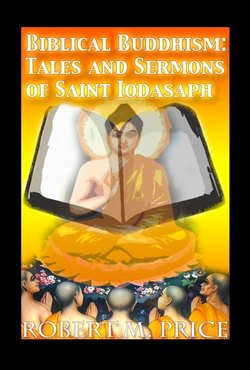Читать книгу Biblical Buddhism: Tales and Sermons of Saint Iodasaph - Robert M. Price - Страница 4
На сайте Литреса книга снята с продажи.
1. The Great Commandment
ОглавлениеIn the common hall of the monastery of Saint Iodasaph uncommon things were often heard. And it is told that one evening the Blessed Iodasaph ended the long period of gathered silence with the following preachment:
In the scroll called The Great Book of the Second Dharma, it is recorded that he who set in motion the Wheel of Dharma among the Jews, Moses, one day arose and spoke thus to his disciples, "Hear, O monks: Isvara our God, Isvara is one; and you shall love Isvara your God with all your heart, and with all your soul, and with all your might."
Here is the great statement of Truth which towers like Everest. It has many heights, many slopes, and each is full of beauty to whomever should view it from whatever height. If one can see but the lower slopes of the mountain, one has still seen beauty. But there are higher slopes, and let the arhat not rest till he has scaled the heights and assumed the vantage point from which the crest may be apprehended.
What if one should see the pronouncement of the Lord Moses from the foothills of Truth? It is to such a perspective that he refers when he warns the unworthy, "Take heed that you go not up into the mountain, or touch even the border of it." But if one is worthy, yet only such that one may stand upon the bottom-most slopes, this is what one will see:
Moses will be understood to command that one should devote one self to Isvara, the Lord with qualities, with all of one's strength and resources. On this level of perception, which none ought to despise, one sees the Truth under the form of the Sambogkya; one beholds Isvara as a celestial deity. As he appears to his devotees, Isvara is the creator of this world, which does not yet appear to be such as it is, the realm of Maya. But if he has created the whole of this world, then the homage of all his world is most surely due him.
And if the worship of a world be due him, as it somewhere says, "Let all that hath breath praise Isvara," how much more the whole of the self, which is but the microcosm of the creation? Manifestly no less can be due Isvara than this, and manifestly no less can be expected of his devotees than to love him with all the heart, soul, and mind.
But if through Karma or the mediation of some bodhisattva one should ascend to a higher slope of the Mountain of Truth, whether this be called Sinai or Meru or some other mountain, how would one then come to understand the commandment of the Dharma-giver Moses? One's understanding would be enlightened, and one would come to see new meaning in his words.
As one approached the heights of the Dharmakya, the Truth might be apprehended according to its Suchness, whence it is said that Moses, atop the summit, besought Isvara that he might see his face, and Isvara said to him, "You shall not see my face, for flesh shall not see me and live, but I will cause my back to be seen." So Isvara said to Moses, for with the eye of flesh, only the back of the Truth may be seen. But with the third eye open one sees that there is no frontward visage of Truth to look upon, for it is without qualities; it is Void.
If, then, one should thus view matters, with the eye of Dharma, how should Moses' commandment appear? One should then see, as the Lord Gautama saw, that heart, soul, and might alike vanish away as mist, even with Isvara himself. As one leaves behind the foothills of the Sambogkya and ascends to the crest of the Dharmakya, one sees plainly that all duality is overcome, that there is only the Truth-body, naught but the Buddha-nature.
One rejoices to see that heart, soul, might are but the conditioned aggregates on the plane of Samsara; that they are no true self. One rejoices to see that Isvara, too, is but the reflection, the projection of the aggregates, a mirror reflection of a dream, for which cause it is written, "Now we see in a looking glass darkly, but then face to face."
O monks, once the arhat passes over the illusion of a self compounded of fleeting fragments of heart, soul, might, one will surely have passed beyond the illusion, benign though it be in its season, that Isvara is aught but one's own original face. One will then have come to see that the Great Commandment of the Lord Moses is best obeyed by those who meditate on the mantra "I Am That I Am," before whom there is neither God nor devotee, between whom there is no difference.
And such was the effect of the homily that, once given, none of those present could be sure that it was not he himself who had delivered it.
